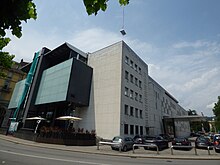This article has multiple issues. Please help improve it or discuss these issues on the talk page. (Learn how and when to remove these messages)
|
| Casinò Lugano | |
|---|---|
 | |
| Location | Lugano, Switzerland |
| Address |
|
| Opening date | 29 November 2002 |
| Notable restaurants | Elementi Ristorante |
| Casino type | Land |
| Architect | Achille Sfondrini |
| Previous names | Teatro Kursaal (1804–2002) |
| Renovated in | 2014 |
| Coordinates | 46°0′14.4″N 08°57′18″E / 46.004000°N 8.95500°E / 46.004000; 8.95500 |
| Website | Official website |
Casinò Lugano (formerly known as Teatro Kursaal) is a casino and theatre designed by Italian architect Achille Sfondrini in the 19th century. It is located in the city of Lugano, Switzerland. A restaurant and café called Elementi Ristorante is located within the building. The theatre was the host venue of the first Eurovision Song Contest in 1956.
History


Designed by the Italian architect Achille Sfondrini in the 19th century, Teatro Kursaal was the first games room with a café to open in Lugano. Biriba, Basset, and dice games were played in the establishment during the autumn fair. Upon the establishment of the Lugano Theatre Society in 1885, which consisted of 177 shareholders, discussions were held to modify the building for the intended purpose of theatrical and musical performances, ballroom dance and other shows. Plans were made to accommodate a café and restaurant adjacent to the main theatre.
In 1912, the theatre acquired a gambling license. The society changed its name to Società del Teatro e Casinò Kursaal di Lugano in 1922. The Kursaal continued to increase its revenue after the Great Depression.
In 1946, the theatre broke its own financial record, accumulating 641,777 Swiss francs (equivalent of €558,558.65 US$811,018.50 or £519,190.25 as of May 2021) after staging operas, plays, concerts and films.
On 24 May 1956, the theatre hosted the inaugural Eurovision Song Contest.
The gambling stakes for playing were raised, from 2 Swiss Francs to 5 Swiss Francs, after a shareholders' vote in 1959.
The city of Lugano became the major shareholder in 1970 after its purchase of 184 shares. Following the ordinance of the Swiss Federal banking commission changes, fruit machines and boules were brought into the Kursaal.
The fundamental principles were amended in 1993 to allow major games to be played on the premises. This license was later upgraded, to permit the company to operate as a casino. The theatre closed shortly after the last show in April 1997 and was demolished in 2001 to make room for the extension of the Casino. Casinò Lugano opened again on 29 November 2002.
Casinò Lugano has received an extension to its permit to also manage casino games online and has conceived the Swiss4Win brand for its entry into the online Swiss market.
References
- ^ "History of Casino Lugano". Casino Lugano. Archived from the original on 4 July 2013. Retrieved 28 June 2013.
- ^ "Eurovision Song Contest History by Year". European Broadcasting Union. Retrieved 31 March 2011.
- Carniel, Jessica (2023). "High, low and participatory: the Eurovision Song Contest and cultural studies". In Dubin, Adam; Vuletic, Dean; Obregón, Antonio (eds.). The Eurovision Song Contest as a cultural phenomenon : from concert halls to the halls of academia. London; New York: Routledge, Taylor & Francis Group. pp. 164, 173. doi:10.4324/9781003188933-14. ISBN 978-1-03-203774-5.
- ^ "Casino Lugano". ticino.ch. Retrieved 31 May 2024.
- "Swiss4Win.ch by Casino Lugano sigla una partnership con Games Global". Casinò Lugano (in Italian). 18 January 2024. Retrieved 31 May 2024.
External links
- Casino Lugano – Official Website
- Swiss4Win - Online Casino Lugano Official Website
- Pierre Lepori (2005). "Teatro Kursaal, Lugano TI". In Andreas Kotte (ed.). Theaterlexikon der Schweiz / Dictionnaire du théâtre en Suisse / Dizionario Teatrale Svizzero / Lexicon da teater svizzer [Theater Dictionary of Switzerland] (in Italian). Vol. 3. Zürich: Chronos. pp. 1815–1817. ISBN 978-3-0340-0715-3. LCCN 2007423414. OCLC 62309181.
| Preceded byN/A (first venue) | Eurovision Song Contest Venue 1956 |
Succeeded byGroßer Sendesaal Frankfurt |
| Music venues in Switzerland | |
|---|---|
| Bern | |
| Basel | |
| Geneva | |
| Lausanne | |
| Zurich | |
| Other cities |
|
| Music festivals |
|